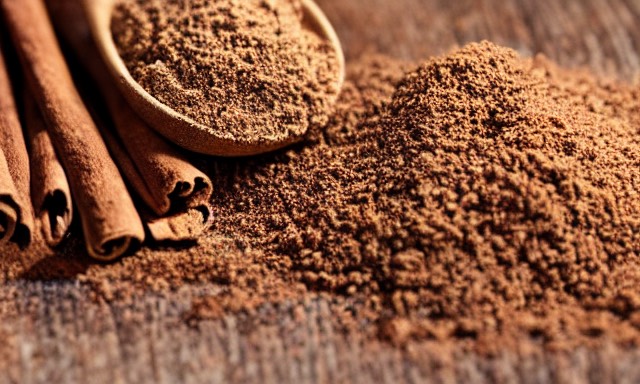Internet Asks: “Carbs in Cinnamon”
Get ready to sprinkle some spice and delve into the aromatic world of cinnamon as we uncover the truth about its carb content. Cinnamon, the beloved and versatile spice, has been cherished for its warm and comforting flavor for centuries. But for those keeping an eye on their carbohydrate intake, understanding the carb count of cinnamon is essential. So, let's embark on a flavorful journey and unravel the carb mystery of cinnamon!
sponsored links

The Sensational Spice
Cinnamon, derived from the bark of the cinnamon tree, has a rich history dating back to ancient Egypt. Ceylon cinnamon, native to Sri Lanka, offers a mild and aromatic flavor, while cassia cinnamon, from China, is spicier and better suited for cooking. Cinnamon production is centered in Indonesia, China, Vietnam, and Sri Lanka. The trees are harvested, and the inner bark is dried and curled into the familiar cinnamon quills. While cassia is more commonly found in supermarkets, acquiring the delicate Ceylon variety can be more challenging.
Distinguishing Ceylon and Cassia
While both types of cinnamon come from trees in the Cinnamomum genus, they possess distinct flavor profiles. Ceylon cinnamon (C. verum), also known as True cinnamon, has a milder and more aromatic flavor, historically making it the preferred variety. It has a lighter brown to tan color and a finer texture. The name "Ceylon" refers to the former name of Sri Lanka, the primary producer of Ceylon cinnamon. On the other hand, cassia cinnamon (C. cassia) is spicier and more pungent, retaining its flavor better when subjected to heat during cooking. Cassia cinnamon tends to have a darker reddish-brown color and a coarser texture. In supermarkets, cassia cinnamon is more commonly found, while acquiring the delicate Ceylon variety can be more challenging.
Carb Content of Cinnamon
Good news for carb-conscious individuals: cinnamon is extremely low in carbohydrates. In fact, it contains a negligible amount of carbs per serving. Typically, a teaspoon of ground cinnamon (around 2.6 grams) contains only about 2 gram of carbohydrates. This makes cinnamon a great spice to incorporate into your recipes without worrying about its impact on your carb count.
sponsored links
Benefits Beyond the Flavor
Cinnamon not only enhances the taste of your favorite dishes but also offers various health benefits:
- Antioxidant Power: Cinnamon is rich in antioxidants that help combat oxidative stress and inflammation in the body. These antioxidants may contribute to overall health and well-being.
- Blood Sugar Management: Studies suggest that cinnamon may help improve insulin sensitivity and assist in regulating blood sugar levels. This makes it a valuable spice for individuals with diabetes or those looking to manage their blood sugar levels.
- Heart-Healthy Properties: Cinnamon has been linked to potential cardiovascular benefits, including reducing blood pressure and cholesterol levels. Incorporating cinnamon into a heart-healthy diet may support overall cardiovascular health.
Incorporating Cinnamon in Creative Ways
Now that you know cinnamon is low in carbs and offers health benefits, it's time to spice up your culinary adventures. Here are some fun and delicious ways to incorporate cinnamon:
- Breakfast Delights: Sprinkle cinnamon on your morning oatmeal, yogurt, or toast for a flavorful and nutritious start to your day.
- Sweet Sensations: Add a dash of cinnamon to your baked goods, smoothies, or homemade granola for a touch of warmth and depth of flavor.
- Savory Surprises: Don't limit cinnamon to sweet treats. Experiment with adding a pinch of cinnamon to your roasted vegetables, soups, or marinades for a delightful twist.
Conclusion
In conclusion, cinnamon, the aromatic and versatile spice, adds a delightful touch to our culinary creations. With its low carb content, cinnamon can be enjoyed by those mindful of their carbohydrate intake. Whether you choose the mild Ceylon or the spicier cassia variety, cinnamon offers a range of flavors to explore. Beyond its delicious taste, cinnamon also brings potential health benefits, making it a valuable addition to a balanced diet. So, get creative and sprinkle some cinnamon magic into your dishes for a flavorful and nutritious experience.
sponsored links
References
- USDA.Spices, cinnamon, ground https://fdc.nal.usda.gov/fdc-app.html#/food-details/171320/nutrients
- WebMD. Cinnamon. https://www.webmd.com/diet/supplement-guide-cinnamon
- Hill & Vale. What is Cinnamon. https://www.hillvale.co.uk/blogs/ingredients/cinnamon
People are also reading...
Does Sprite Have Caffeine?
Calories In Steak?
Chicken Taco Calories?
Does Hot Chocolate Have Caffeine?
Are Carrots Acidic?
Are Mangoes Acidic?
Orange Juice pH?
Does Kahlua Have Caffeine?
Calories In a Grilled Cheese?
Is Watermelon Acidic?
6 oz Steak Calories?
Are Strawberries Acidic?
Ready to level-up?
Create meal plans 10x faster, follow up with your clients through our mobile app, and never struggle with meal planning or recipe management again.